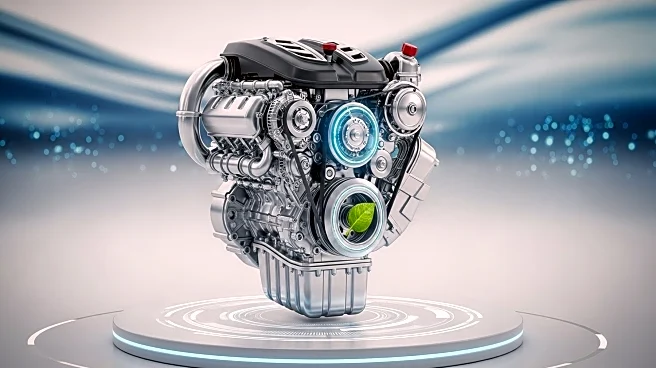What is the story about?
What's Happening?
Everllence is celebrating the 10th anniversary of its ME-GI dual-fuel engine, which has become a leading technology in the maritime industry. Since its introduction, the ME-GI engine has accumulated 1,010 orders, with over 500 units currently in operation at sea. The engine is recognized for its high efficiency and low methane emissions, setting a new standard for two-stroke propulsion engines used in various marine vessels, including container ships, bulk carriers, and tankers. The ME-GI engine's design allows for seamless operation between gas and diesel, providing shipowners with a reliable and environmentally friendly solution. The engine's success is attributed to its ability to meet the growing demand for decarbonization and fuel flexibility in the shipping industry.
Why It's Important?
The ME-GI engine's success highlights a significant shift in the maritime industry towards more sustainable and efficient technologies. As regulatory pressures and the need for decarbonization increase, the adoption of dual-fuel engines like the ME-GI is expected to grow. This trend not only benefits the environment by reducing emissions but also provides economic advantages to shipowners through fuel flexibility and operational efficiency. The ME-GI engine's ability to operate with lower methane emissions positions it as a preferred choice for new shipbuilds, potentially influencing future maritime regulations and industry standards.
What's Next?
Looking ahead, Everllence anticipates a diversified fuel mix for dual-fuel engines, with methane expected to power approximately 20% of the global fleet by 2050. The company plans to continue innovating with the ME-GI platform, introducing new designs like the Mk10.7 to enhance performance and efficiency. As the maritime industry continues to evolve, the ME-GI engine is likely to play a crucial role in shaping the future of sustainable shipping, influencing both market trends and regulatory frameworks.
Beyond the Headlines
The development and success of the ME-GI engine reflect broader trends in the global push for cleaner energy solutions. The maritime industry's shift towards dual-fuel engines is part of a larger movement to reduce carbon footprints across various sectors. This transition not only addresses environmental concerns but also aligns with international efforts to combat climate change. The ME-GI engine's impact extends beyond immediate operational benefits, contributing to long-term sustainability goals and setting a precedent for future technological advancements in the industry.
















